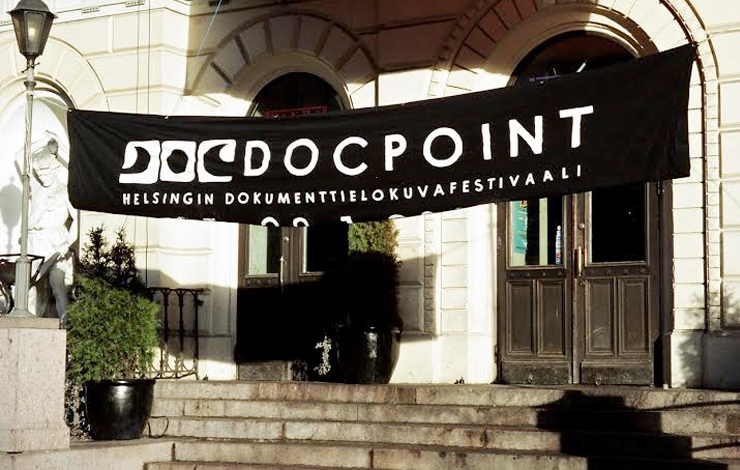
DocPoint Helsinki Documentary Film Festival ( www.docpoint.info ) is full of surprises. Who would think to go to Finland for discovery of new Portuguese and Japanese films, or an intensive master class with Fred Wiseman? That is just what happened this January as the noncompetitive festival celebrated its fifth anniversary. Founded by filmmaker Arto Halonen, it is now ably run by Executive Director Kai Huotari and Artistic Director and noted filmmaker Kristina Schulgin. January in Finland is perfect for staging a documentary film festival. Long cold nights and short cold days make for a very attractive impetus to sit in a theater and watch films, and the festival attracted an estimated audience of 19,500.
The centrally located festival headquarters provide a café for gathering, big rooms for panels, the lively and loud nightly parties and all the screening venues. Like most everyone in Finland, the festival staff is polite and very well organized and everyone speaks English.
There is Dokkino -an event for children and youth that both screens documentaries and gives children an opportunity to produce and screen their own work-and the Mundo Project, managed by the Finnish Broadcasting Company, YLE, and funded by the European Social Fund's EQUAL program, in which immigrants and ethnic minorities-less than 30 percent of the Finnish population-make films that reflect their own perspectives on Finland. A selection of works from the Finnish film schools is also offered.
Eighteen new Finnish films were showcased, along with other selections from earlier years. The opening night selection, Y in Vyborg by Pia Andell, consists solely of spectacular 8mm footage shot between 1938 and 1949 by husband-and-wife architects Miri and "Y," coupled with readings of letters exchanged between the two as they were separated in these tumultuous years. The film is one of the finer examples of home-movie footage used to create a lyrical new documentary, and it also revolves around a theme that is constant for Finns-the country's fate in the 1938-39 Winter War with Russia and its status as a German ally in WWII. These issues are likewise explored in Over the Ice by Seppo Rustanius.
Other more modern subjects also attract the many accomplished Finnish filmmakers. Issues of homelessness, conflict in the Middle East and many portraits of individuals are tackled. Fortunately, it seems as though the personal diary approach craze has passed by this country. This is not the case with new Japanese cinema. Representing the Yamagata Festival were Kazuo Hara and Shisso Kobayashi, his wife and producer, who screened two of their films, including the classic The Emperor's Naked Army Marches On , (1987), which, astonishingly, screened to much laughter from young Finns in the audience. According to Hara, younger Japanese documentarians are interested mainly in films about themselves, not in the social issue and "organized" films of the first two generations of Japanese documentarians.
North America was represented by such favorites as RIZE (David LaChapelle, dir.) Enron: The Smartest Guys in the Room (Alex Gibney, dir./prod.), Murderball (Henry-Alex Rubin, Dana Adam Shapiro, dirs./prods.), Grizzly Man (Werner Herzog, dir.), Mad Hot Ballroom (Marilyn Agrelo, dir./prod.), Three of Hearts (Susan Kaplan, dir.) and Street Fight (Marshall Curry, dir./prod.). The political high-jinks of the latter was echoed, in a subdued, Finnish way, by the real-life presidential run-off election that took place in Finland during the festival. Tarja Halonen, the female incumbent, who has a history of single-motherhood and chairmanship of the country's largest gay and lesbian group (although not homosexual herself), along with being a running joke on late-night US television for her resemblance to Conan O'Brien, was challenged by a conservative man. His team was handing out free coffee in the city squares. Halonen won, much to the joy of festival participants, who were amazed that the challenger even made it to the run-off stage in their proudly self-proclaimed welfare state.
Honored at the festival with the Apollo Award was Jarmo Jääskelainen. He is credited with starting and enhancing the current documentary boom in Finland since the early 1990s by beginning and nurturing the TV2 Dokumenttiprojekti, the major television venue for documentaries. It was he who first brought many famous international films to Finland and is known as 'the Godfather of Finnish documentary film."
A selection of Wiseman's films was also presented, and his appearances were standing-room-only. There was a small video screening market for film buyers, meetings and pitches among Nordic country filmmakers and representatives from Baltic countries like Russia and Estonia, with whom Finland shares a special history. However, for those eager to watch documentaries, DocPoint is best at presenting a wide range of works that are otherwise very difficult to find. Most are subtitled or have voiceover in English, so language differences are only a minor problem. Documentarians visiting Helsinki should also pay a visit to the Finnish Film Archive, a treasure trove of footage that is mostly unknown outside of the area. And of course a really good reason to visit Finland is to sample the national dishsautéed reindeer served on mashed potatoes with lingonberries, a treat that even vegetarians should try at the traditional Lappi Restaurant, along with an Arctic Bramble Royale: Arctic bramble liquor and sparking wine.
